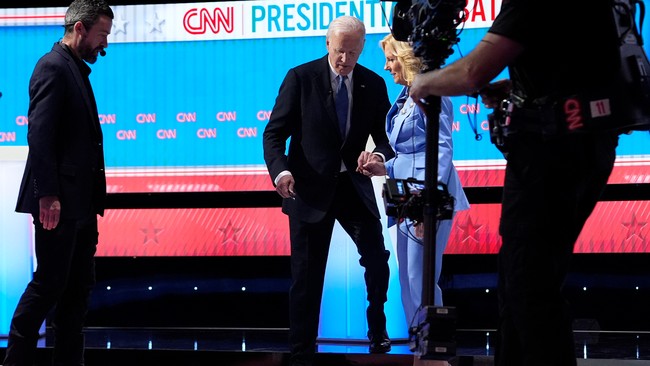… but do we get the why? Not in any believable version, anyway.
The New York Times just dropped an interesting tick-tock on the shocking way in which the Democrat Party forced its duly-elected nominee off the ticket last month. The sequence of events has come out in less detail before now, from Anita Dunn on the record last week. Until now, though, no one has gotten inside Biden’s head to explain why he allowed himself to be chased out of a nomination that he’d already won.
This doesn’t deliver on that either, but it certainly explains the bitterness Biden has exhibited since. This is as close as it gets to an explanation:
For more than three weeks, Mr. Biden had insisted he would stay in the race. Only the “Lord Almighty,” he said, could get him to drop out.
But by that Saturday evening, something had shifted.
It was not just about the polls, people close to Mr. Biden say. Despite everything, Mr. Biden believed he could still claim the Democratic nomination and beat former President Donald J. Trump. Aides say that he still believes that.
What began to change the president’s mind, people familiar with his thinking say, was the realization that if he stayed in the race, he was in for a lonely battle that would rip apart the Democratic Party, the cause he had served nearly his entire life. Would a man who views himself as the ultimate consensus builder in Washington want to wage an intraparty war that would run counter to the fabric of who he is?
Ahem. Biden may be deluded enough to see himself as the “ultimate consensus builder in Washington,” but we have no evidence for that at all in reality. In the real world, Biden is a vicious demagogue who routinely issues personal attacks on his opponents while claiming they love him off the record. This is the same man who accused Mitt Romney of wanting to put black voters “back in chains” in the 2012 election campaign, and who has vilified GOP leadership in personal terms for decades whenever they oppose his agenda.
Heck, he even vilifies voters when they disagree with him. Remember this moment of consensus building from four years ago?
Yes, Biden did want to take AR-15s (not AR-14s) and other so-called “assault weapons” away from Americans. “I own a shotgun” does not negate Biden’s repeated demands to ban long-barrel semi-automatic firearms on the basis of their scary looks. And that’s only one demonstration of Biden’s instincts on consensus building.
Still, I’m willing to believe that Biden’s deluded himself into thinking that he’s the only consensus builder left in Washington. But that makes this explanation even less credible. Biden won the nomination in 2020 in part because he was all that was left of the old-school Democrats that could tie the party back to its working-class roots. If he wanted consensus, why would he abandon the nomination? Why then endorse a progressive-elitist clique darling like Kamala Harris?
Especially when Biden still thought he could win the election?
Yet those inside the small circle of family members and advisers who were with the president at the very end insist that the story of how Mr. Biden went from defiance to acquiescence was not about convincing him that he was destined to lose. That never happened, according to people close enough to Mr. Biden to know his thinking, who spoke on the condition of anonymity to discuss the president’s decision-making in the final hours. …
People close to the president said that no one hid the grim realities from him, but that he never stopped believing that he would have been the party’s nominee had he stayed in the race and that he could have beaten Mr. Trump.
The “grim realities” were that Biden’s polling average had momentarily dropped to his pre-SOTU level after the debate. And by the time he withdrew, his numbers had come almost entirely back to the pre-debate level:
Anita Dunn saw the same thing, and told Biden so. This prompts the question again: If he thought he could win the election, why withdraw? Why either risk an open convention to replace him, or the political danger in bypassing all democratic functions to have the party’s elders choose his replacement in a weird Anointment? Surely those risks would have come into consideration as potential party-destroying options too.
None of this adds up. This sounds like an extension of Biden’s Oval Office address, which also didn’t add up. It certainly didn’t explain why Biden worked so hard to ensure his renomination just to toss it away over some bad polling, which was already bouncing back by the time he withdrew. Nothing in this NYT tick-tock explains why it took three days to deliver that address either.
This looks like a clean-up effort on the part of the White House, or maybe the Harris campaign. Democrats seem desperate to keep people from asking too many questions about Biden’s disgraceful withdrawal, and why he really retreated.
Read the full article here






![Charlamagne Slams Obama for Cozying Up to ‘Threat to Democracy’ [WATCH] Charlamagne Slams Obama for Cozying Up to ‘Threat to Democracy’ [WATCH]](https://www.lifezette.com/wp-content/uploads/2025/01/2025.01.10-05.25-lifezette-6781580d97b17.jpg)



![Biden Team ‘Screamed’ Over Satire Posts [WATCH] Biden Team ‘Screamed’ Over Satire Posts [WATCH]](https://www.lifezette.com/wp-content/uploads/2024/08/2024.08.27-12.31-lifezette-66cdc738e2a10.jpg)